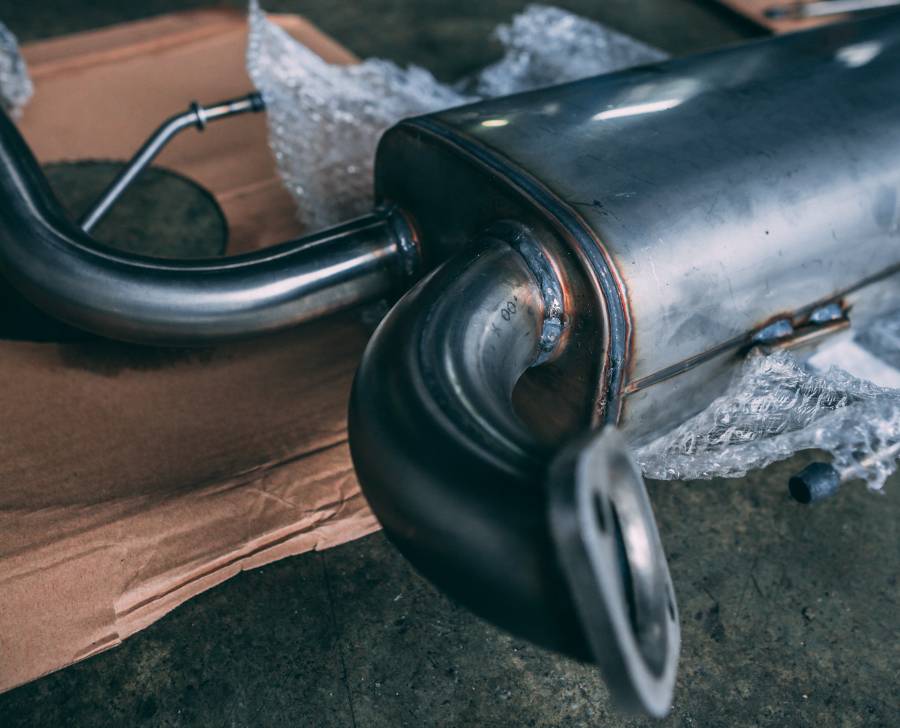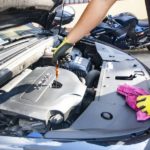Quick Navigation
If exhaust fumes emerge out of your car or there are loud engine noises, then the chances are that the exhaust manifold is leaking oil.
It is one of the most common problems that all vehicle owners encounter.
There are several tell-tale signs of an exhaust manifold leaking oil. They include roaring engine sounds and poor fuel average.

In some cases, you may also notice exhaust fumes or a pungent odor emerging from your car. It is necessary to deal with these issues as soon as possible.
If left untreated, these can cause severe damage to your vehicle.
4 Causes Of Exhaust Manifold Oil Leak
Following are some of the reasons why the exhaust manifold is leaking oil.
1. Valve-Train Seal Leakage
It is one of the primary reasons that lead to reducing oil concentration. There are changes in the structure of the seal that ultimately lead to oil loss.
The seal may get ruptured, and its size or flexibility may decrease.
Leaking seals also produce a specific type of exhaust fumes that can be blue or gray.
However, this state only occurs when there is a significant oil leak due to the damaged seal.
Exhaust manifold leaking oil due to valve seals is typical for older models of vehicles that are no longer in use.
2. Clogged PCV Valve
The positive crankshaft valve effectively holds the motor oil. You can find this valve below the engine.
It plays a role in regulating gas emissions due to fuel burning. It captures these releasing gasses and transfers them to the combustion chamber.
As a result, they do not impact the functioning of your vehicle.
Clogging of PCV valves can be one of the reasons for exhaust manifolds leaking oil. Damage to the valve results in the leakage of the oil and poor vehicle performance.
3. Cracked Gasket
The head gasket is the intermediate region between the engine block and cylinder head. Therefore, it allows the passage of oil and water.
When the gasket head blows, you will notice an oil leak.
The coolant also seeps through the seals in some cases due to blown-up gaskets. It may also cause excessive fuel burning and ultimately reduce your car’s mileage.
The gasket traps the combustion gasses. It keeps them in the cylinder and prevents the oil from entering there.
Furthermore, it may also cause oil build-up on the filter cap or produce white smoke.
4. Issues With The Manifold
The manifold is primarily responsible for filtering out the excessive smoke that fuel-burning produces.
It only releases a small number of exhaust fumes to prevent damage to the environment and your vehicle.
Therefore, the entire manifold should be in pristine condition to efficiently perform its function.
The exhaust manifold goes through instant heating and cooling phases. Sometimes these can impact the manifold structure and produce plenty of cracks.
Moreover, some specific bolts and screws hold the manifold. Two large bolts maintain the function and structure of the manifold.
The instant changes in temperature or resistance in the exhaust fume processing procedure may compromise the integrity of these bolts.
As a result, you will see that the exhaust manifold is leaking oil. Manifolds that have not been changed for some time are also prone to damage.
Solutions
Thoroughly search your engine, oil filters, and exhaust manifold to determine why the exhaust manifold leaks oil.
Only then can you devise the most appropriate solution for dealing with the issue.
Following are some ways you can employ to resolve the problem of exhaust manifold leaking oil.

Replacing PCV Valve
The PCV valve uses plastic as its structural components. Therefore, it is susceptible to the constant heat exchanges in the engine unit.
Over time with poor engine maintenance, the damage to the PCV seal starts having consequences on your vehicle’s engine.
If the exhaust manifold is leaking oil due to the poor condition of PCV, then there is no instant way of fixing the component. You will have to replace it.
You must invest around $100 to find a durable PCV valve. Afterward, you can remove the older one by loosening the screws, turning it clockwise, or twisting it.
Moreover, if the exhaust manifold is leaking oil due to the clogging of the valve, then you must remove it and clean it.
You can use any chemical detergent or cleaning spray to eliminate all kinds of debris in it. Brake cleaners are most suitable for removing dirt and oil.
Fixing The Valve Train Seal
The only way to prevent the exhaust manifold from leaking oil due to broken valve train seals is by rebuilding it.
The process is quite detailed and involves professional help. As soon as you notice the issue with the valve seal, you must take your car to the workshop.
To fix the valve, they will have to disassemble the entire engine. It allows them to access the valves and pinpoint the one causing the exhaust manifold to leak oil.
Therefore, the process requires an investment of around $800-$1000.
Replacing The Gasket
A cracked gasket is one of the leading causes of exhaust manifold leaking oil. It would be best to repair it before severely compromising your vehicle’s performance.
You will have to remove engine components such as exhaust manifolds for the process.
In some cases, you may also have to remove the intake manifold to gain appropriate access to the gasket.
Before disassembling the components, you must remove the battery terminals.
Moreover, you should also turn off every type of electrical connection present in the vehicle. It would help if you also eliminated the coolant.
It can interfere with the engine oil during the replacement procedure.
Afterward, it would be best if you took off the cylinder head. It will require you to detach some bolts and screws.
Once you remove the cylinder head, you will have room to insert the new gasket. A quick tip that can help you with the process is marking the parts.
If you label each component you remove, you will easily reinstall it.
Repairing Exhaust Manifold
In older cars, you will notice that the exhaust manifold is usually quite rusted; the condition promotes damage to the manifold.
You must either replace it or weld it to fix it. You can easily target the sites that have cracks and holes.
Furthermore, you can remove the manifold to pinpoint the deteriorated regions. You can use the soldering iron to restore the strength of the exhaust manifold effectively.
Conclusion
Exhaust manifold leaking oil requires timely attention and measures. The signs of the leaking oil are usually quite visible.
You can find the leaking oil on the floor. However, your car’s declining performance may indicate that the exhaust manifold is leaking oil in some cases.
Nevertheless, if you notice the check engine light or reduced mileage, you must analyze the working of different engine components.
You should instantly find out the underlying issues. You can resolve a few problems that cause the exhaust manifold to leak oil.
However, you will have to require help from professionals in some cases. Therefore, assess your engine conditions and exhaust manifold.
If the problem lies within your domain, then you should solve it.
Otherwise, If you need to separate the engine parts for rectifying the faults, it is better to contact the experts.

Kevin has been hanging around cars and automobile magazines since he knew what a car is. He grew up in his father’s 1995 Mercedes E320 Wagon and Volkwagon Phaeton W12 2004. He rides his first car, a manual 1979 Porche 911SC.
Currently, he owns an Acura Integra GS-R. During his childhood, he showed a keen interest in how things actually work and fix them. This passion transforms into his eternal love for cars and bestows him an ideal position in one of the leading automobile companies; whenever he finds time, he takes out his Acura and opts for the longest possible route to find hidden wholesome pleasure in a road trip.
Want to read some of the articles written by Kevin? Head to our blog section to find out all the articles written by Kevin.






